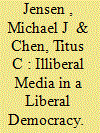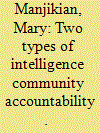| Srl | Item |
| 1 |
ID:
180527


|
|
|
|
|
| Summary/Abstract |
The regime of censorship in the People’s Republic of China (PRC) extends beyond its borders through the extraterritorial application of its media regulations to popular social media platforms like WeChat. This research investigates the effects of the PRC’s extraterritorial control of online content on the identity narratives and norms communicated by comparing Australia’s Special Broadcast Service (SBS) Mandarin language news and the news targeting Australian audiences published on popular WeChat Official Accounts (OAs). We find significant differences in the news content between these two platforms: SBS provides more political content and a focus on political and cultural integration, while WeChat pages tend to avoid political topics that are not otherwise press releases from the PRC and they encourage strong cultural ties with Mainland China. Finally, SBS tends to both inform and cultivate democratic political identities and identification with the Australian political system, whereas WeChat tends to differentiate the Chinese diaspora from the wider Australian community. We situate these findings within a wider understanding of PRC’s national security strategies and doctrine. Whether by requirement or practice, not only the WeChat OAs in Australia implement PRC’s communication controls, but the content on these pages also challenges the liberal democratic practices and norms and supports foreign influence and espionage in Australia.
|
|
|
|
|
|
|
|
|
|
|
|
|
|
|
|
| 2 |
ID:
167682


|
|
|
|
|
| Summary/Abstract |
The term globalization, encompassing politico-economic and socio-cultural aspects, is widely used to describe the results of rapid modernization on Saudi Arabia in an era of rapid societal transformation. Whilst the outward signs of increased globalization in the Kingdom are highly visible, the underlying effects particularly in terms of the politico-economic and socio-cultural less so. Indeed, globalization is often characterized as inevitable or unstoppable. Yet, in a ‘globalized’ Saudi Arabia the impact of globalization is not always perceived as being positive, in particular its impact on notions of individual, national or Islamic identities. Research conducted for this article demonstrates that young Saudi men identify clearly both positive and negative effects of globalization on identity narratives, whether individual, national or Islamic. Indeed, the issue of how young Saudi men negotiate their identity in light of increased globalization raises important questions regarding the consequences of increased globalization on young Saudi men's sense of their own identity, and by extension the government's promotion of an officially sanctioned Saudi national identity, in an era of rapid societal transformation.
|
|
|
|
|
|
|
|
|
|
|
|
|
|
|
|
| 3 |
ID:
145588


|
|
|
|
|
| Summary/Abstract |
Most academic writing on accountability in intelligence organizations presents a bureaucratic politics model which describes investigations and hearings as turf wars between competing organizations and interests. However, within public administration, a second model of organizational accountability exists. In this model, hearings and investigations are not wars over resources, but rather attempts to clarify the organization’s mission and identity. In analyzing transcripts from the 1975 Church Committee Hearings, we can find evidence that the investigation in fact included both types of accountability exercises. Hearings sought both to discipline wayward agencies and to help all parties understand the events which occurred and what these events meant for the identities of the agencies involved, within the context of a democratic society.
|
|
|
|
|
|
|
|
|
|
|
|
|
|
|
|